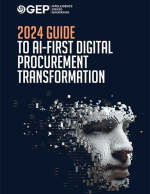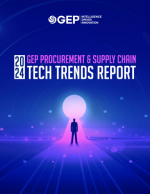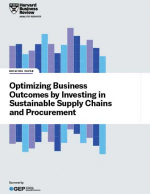The Cognitive Supply Chain: What Does It Take to Build One?
In this survey, The Cognitive Supply Chain: What Does it Take to Build One?, GEP and CIO.com discuss the building blocks of an intelligent supply chain network, these are the key elements you’ll need to build a digital, cognitive supply chain that gives your business a unique competitive advantage.
What Makes a Supply Chain Intelligent?
You’ve heard so much about the need for an “intelligent” supply chain. And how it can provide your business the much-required agility and resilience, especially during disruptions.
But what really makes a supply chain intelligent? More importantly, how do you build one?
On the supply side of the equation, data is coming from partners’ ERP systems as well as Internet of Things (IoT) sensors on manufacturing equipment and in-vehicle GPS systems. Organizations are also tapping into new sources of information such as weather reports and news about labor unrest; raw materials shortages; and, nowadays, countries’ gradual “reopening” schedules and activities.
Managing all this big data involves tackling “four Vs”:
- VOLUME. During 2018 alone, digital storage platform suppliers added more than 700 exabytes of storage capacity to the worldwide installed base, according to IDC’s Global StorageSphere report. The data explosion includes a large volume of supply chain information from warehouses, financial and procurement apps, logistics and distribution companies, and materials suppliers, among others.
- VELOCITY. Data is entering organizations’ storage and processing platforms at lightning speeds, straining systems that must sort, direct, and extract value from this data.
- VARIETY. Structured data can come from a wide variety of ERP, CRM, and financial systems and can be coded in a range of formats. At the same time, unstructured data - from documents to emails and video streams - also plays a bigger role in SCM operations than it did previously.
- VERACITY. Data is of little value if it is inaccurate, out of date, corrupt, or suspect in some other way. With SCM data coming from many different sources, confirming its overall veracity is essential.
Creating the Strategic Cognitive Supply Network
By definition, the cognitive supply network depends heavily on predictive analytics, AI, and machine learning to speed, inform, and automate SCM operations.
These compute- and data-intensive technologies will function within a cloud-based infrastructure, giving companies the scalability, storage, and computational power they need without investment in on-premises infrastructure and skill sets. In addition, cloud-based services can help manage the “four Vs” of data to make sense of that data, gain visibility and control across their supply chains, and perform a wide range of other critical functions.
Download the paper and get insights on:
- Essential technologies to build and support an intelligent supply chain
- Evaluation criteria for tools and software to enable this transformation
- Role of supply chain data and key challenges in managing it
Read today to learn how you can turn the vision of an intelligent supply chain into a business reality.
What’s Related




Favorites





